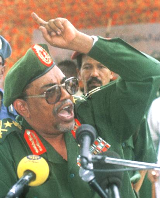Beshir accuses world of targeting Islam in Sudan
KHARTOUM, July 24 (AFP) — Sudanese President Omar al-Beshir has accused the international community of targeting Islam in his country as the government struggles to fend off mounting international pressure over the Darfur crisis, the pro-government Al-Anbaa reported Saturday.
 The paper quoted Beshir as telling supporters in the central region of Gezira following Friday prayers that the real aim of the campaign against his country was not the situation in the troubled western region of Darfur, but to derail the growth of Islam in the country.
The paper quoted Beshir as telling supporters in the central region of Gezira following Friday prayers that the real aim of the campaign against his country was not the situation in the troubled western region of Darfur, but to derail the growth of Islam in the country.
Sudan has come under increased pressure from the international community in recent days to resolve the situation in Darfur, where the UN says at least 30,000 people have died in the 16-month-old conflict between government forces and Arab militia allies and two main rebel groups in the region.
“The international concern about the Darfur issue is targeting the status of Islam in Sudan,” claimed Beshir, who seized power in a bloodless Islamist coup in 1989.
Khartoum has brushed off criticism that it is not doing enough to help alleviate the humanitarian situation in Darfur, described by the United Nations as the world’s worst, and pledged to improve the access of international aid agencies to the region and the needy.
The Sudanese president insisted, however, that his government’s concern for Darfur was first and foremost because of the responsibility it felt for the people before God and not aid agencies or other countries.
He said his national “salvation” government, as the regime’s supporters refer to it, will continue “to adhere to Islamic sharia (law), set an example for social cohesion and bring humanity out of darkness to the light of Islam.”
The president’s comments came as legislators denounced ongoing consultations in the UN Security Council for action against Khartoum, dismissing the moves as interference in the internal affairs of Sudan.
MPs also called on the government to take its case to the Sudanese people.
Chairman of parliament’s peace committee, Abdul Rahman al-Fandy, told the daily Al-Rai Al-Aam that there was a “deliberate misinformation campaign” about the situation in Darfur.
The United States on Thursday put forward a draft UN Security Council resolution authorizing sanctions on Sudan if it does not prosecute Arab militia leaders behind atrocities in Darfur, particularly the notorious Janjaweed, blamed for most of them.
“They have been supporting and sustaining some of these Janjaweed elements. This has to end,” US Secretary of State Colin Powell said.
“It’s a catastrophe. People are dying at an increasing rate,” added Powell, on the same day Congress unanimously passed a non-binding resolution qualifying the atrocities committed in Darfur as “genocide” and calling on the White House to lead international efforts to intervene in the region.
The resolution would “escalate and complicate rather than solve the Darfur crisis,” according to Al-Tigani Mustafa, chairman of parliament’s foreign relations committee, also quoted by Al-Rai Al-Aam.
Fandy argued that the growing pressure and threats of sanctions were “not out of sympathy for the people of Darfur, but an attempt by some leaders to find a way out of their own problems.”
He also accused UN Secretary General Kofi Anan of “intensifying unnecessary and unjustified pressures” on Sudan, and the international community of ignoring reports about ceasefire violations by Darfur rebels.
UN emergency relief coordinator Jan Egeland said Friday that the death toll in Darfur was at least 30,000 and could be as high as 50,000.
